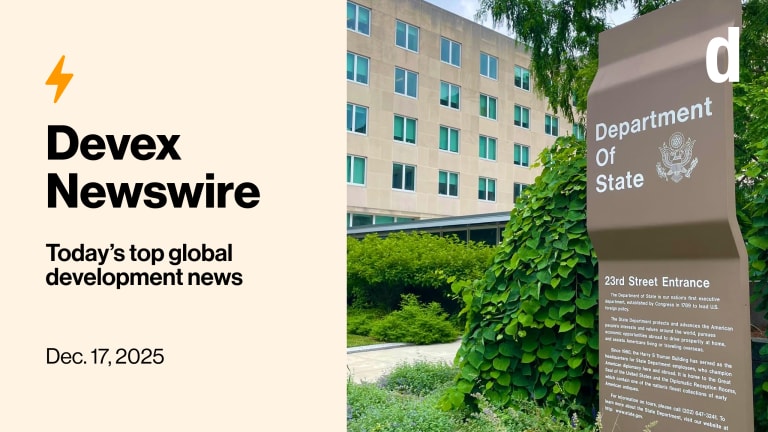
The analysis is stark: Without a significant increase in efforts, women around the globe will have to wait over two centuries to achieve equality in the workplace. Despite increasing global life expectancy rates, this is longer than any of us will be able to wait — no matter the progress of preventative care.
This was certainly the feeling shared by the over 800 participants at the W20 Summit in Argentina. There was unanimous agreement that we need to do more and work together better to remove barriers faster for girls and women to thrive, take control of their lives, make informed choices, and realize their potential. The European Bank for Reconstruction and Development, as one of the participants, can take on a key role.
Introducing #GlobalDevWomen: Stories and advice to support women at work
Women working in global development have long relied on the whisper network to vent about gender bias. Not anymore.
The careful design of policies is a key ingredient for accelerating gender equality. This is where W20 comes in. Established in 2014, it is a forum gathering global gender thought leaders from civil society, businesses, international organizations, and academia.
The aim is to share expertise, experience, and lessons learned from around the globe to shape policies that foster gender equality. In 2014, this resulted in the “25 by 25” commitment of G-20 leaders: to close the gender gap in workforce participation between men and women by 25 percent.
To achieve this goal, W20 has issued policy recommendations that target persistent barriers for women to fully participate in the economy and society more broadly. These recommendations are the result of intense debates between participants from around the world. This year, events were held across all G-20 countries, including EBRD shareholders Russia, Turkey, and the United Kingdom.
The resulting policy recommendations were presented to Mauricio Macri, president of Argentina and host of the G-20, in Buenos Aires last week. They focus on the following four areas:
Increasing and improving women’s participation in the labor force by investing in affordable child care and introducing mandatory paid parental leave schemes, strengthening equal access to justice, and ending sexual harassment at work.
Guaranteeing women’s financial inclusion by ensuring equal access to credit and formal financial services and enhancing the share of public procurement contracts to women-led businesses by at least 10 percent.
Ensuring women’s digital inclusion by enhancing their use of digital technologies, boosting digital skills and STEM education — science, technology, engineering, and mathematics — and ensuring women’s participation in the development and application of artificial intelligence.
Fostering the development of women in rural areas by creating better local infrastructure, entrepreneurship opportunities, and access to financial services.
Formulating policy priorities is important, but to be effective, these recommendations need to be translated into action by authorities in partnership with industry and civil society.
This is where EBRD comes in. As a catalyst for the engagement of the private sector with policymakers, the bank is well-placed to help shape reform across key gender policy areas.
More from #GlobalDevWomen:
► Advice for women leaders from women leaders
► 7 tips for achieving gender balance in your organization
► Opinion: 6 barriers to working in development — and how to change them
The priorities highlighted by W20 align closely with EBRD’s Strategy for the Promotion of Gender Equality. Gender components are integrated not only into the bank’s investment across sectors but, importantly, also into its policy engagement — to increase women’s workforce participation, skills, and entrepreneurship opportunities and access to vital infrastructure services, especially in underdeveloped regions.
For instance, in Kazakhstan, EBRD supports business partners in the power and energy sector to attract more young women to high-quality technical and vocational training programs. The bank also engages with the authorities to reduce and eventually eliminate the list of jobs that women are currently barred from. This resulted in an amendment of the labor code by Kazakhstan’s Minister for Labour and Social Protection on Aug. 13, reducing the number of banned jobs by 25 percent and opening new economic opportunities for women across many sectors.
In Jordan, the bank is engaged in a program that enhances access to justice for female entrepreneurs through a ground-breaking, capacity building program for male and female judges, combined with capacity building for female entrepreneurs. In addition, the bank’s equal opportunities and skills development programs are linking employers to education authorities to enhance access to STEM and vocational training for young women in manufacturing, property and tourism, and other sectors.
W20 provides a high-profile forum to share technical expertise and practical experience on gender policymaking — and the bank is looking to step up its engagement at that level and contribute toward the formulation of global best practice in this context. EBRD can make an important contribution to this.
There is a long journey ahead, but it must not take another two centuries. Projects and policy initiatives such as those outlined above are needed to make a difference and achieve the shortcut to “25 by 25.”
Update Nov. 14, 2018: The article has been updated to show that In 2014, the “25 by 25” commitment of G-20 leaders was to close the gender gap in workforce participation between men and women by 25 percent.








